PM seeks ‘approximation of justice’ over flood losses
Warns UNGA calamity in Pakistan signals global crisis
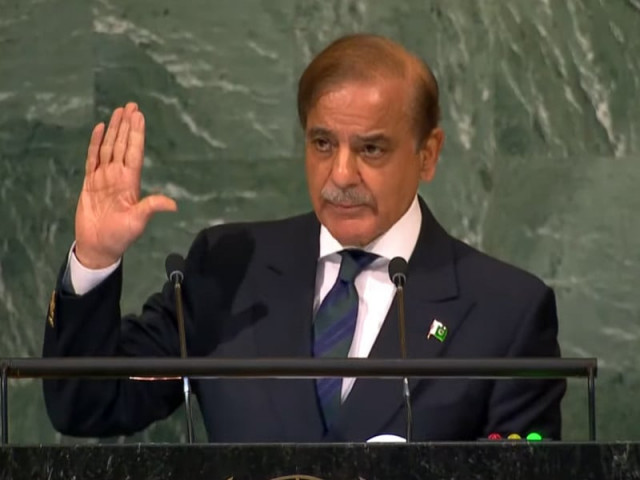
Prime Minister Shehbaz Sharif said on Friday Pakistan expected “some approximation of justice” for the huge losses and damages caused by the climate-induced devastating floods, warning that the nature’s fury would not remain confined to Pakistan.
Addressing the 77th session of the United Nations General Assembly (UNGA) the prime minister said that Pakistan was at “ground zero” of climate change despite contributing less than 1% of carbon emissions.
The prime minister delivered a wide-ranging speech in which he raised the Kashmir issue, the situation in Afghanistan, the war against terrorism, peace in the Middle East and the conflicts in Europe and elsewhere. However, most of the address dilated on the floods and climate change.
“As I stand here today to tell the story of my country, Pakistan, my heart and mind have not been able to leave home. No words can describe the shock we are living through or how the face of the country lies transformed,” Shehbaz said, while opening his address.
“For 40 days and 40 nights a biblical flood poured down on us, smashing centuries of weather records, challenging everything we knew about disaster, and how to manage it. Even today, huge swathes … are still under-water, submerged in an ocean of human suffering,” he added.
Read more: Biden ‘determined’ to continue helping flood-ravaged Pakistan
Shehbaz, in his first address to the General Assembly as the prime minister, warned the world that climate disasters would not remain confined to Pakistan, adding that nature’s reckoning had come upon everyone.
“Pakistan never saw a more stark and devastating example of the impact of global warming,” he said. “One thing is very clear: what happened in Pakistan will not stay in Pakistan. Make no mistake, the hour, the year of nature’s reckoning is upon us!” he added.
Calling Pakistan the “ground zero of climate change”, Shehbaz pointed out that more than 1,500 of people died in the great flood, including over 400 children, 33 million people were at high risk from health hazards, 650,000 women giving birth in makeshift tarpaulins.
“Far more are in peril from disease and malnutrition,” he continued. “As we speak, millions of climate migrants are still looking for dry land to pitch their tents on, with heart-breaking losses to their families, their futures and their livelihoods.”
Prime Minister of Islamic Republic of Pakistan, Shehbaz Sharif addressed the high-Level General Debate of 77th Session of #UNGA in New York.#PMShehbazAtUNGA #PMPakAtUNGA #UNGA77 pic.twitter.com/a6o8ZfbTzf
— Government of Pakistan (@GovtofPakistan) September 23, 2022
The prime minister said that the nature unleashed her fury on Pakistan “without looking at our carbon footprint, which is next to nothing”. He then asked why the people of Pakistan pay the price of such high global warming through no fault of their own.
“It is therefore entirely reasonable to expect some approximation of justice for this loss and damage, not to mention building back better with resilience,” he said, adding his voice to growing calls among developing countries for financial compensation from rich polluters.
He said that the floods impact on the health and wealth of Pakistan was beyond calculation but he worried more about the next stage of the challenge when the world’s focus turns away to other issues. “My question is, will we be left alone, to cope with a crisis we did not create?”
LIVE #APPNews : Prime Minister Muhammad Shehbaz Sharif addresses 77th Session of the United Nation General Assembly #UNGA #UNGA77 #PMPakAtUNGA #PMShehbazAtUNGA https://t.co/QrApHaVKNQ
— APP 🇵🇰 (@appcsocialmedia) September 23, 2022
The prime minister stressed that this “climate injustice” required the world leaders to take immediate remedial actions. “It is high time we took a pause from the preoccupations of the 20th century to return to the challenges of the 21st,” he said.
The entire definition of national security has changed today, and unless the leaders of the world come together to act now behind minimum agreed agenda, there will be no earth to fight wars over. Nature will be fighting back, and for that humanity is no match”, he added.
The prime minister told the world body that Pakistan’s urgent priority right now was to ensure rapid economic growth and lift millions out of destitution and hunger. To enable any such policy momentum, he added, Pakistan needed a stable external environment.
“At this point, the gap between our urgent needs and available resources is amplified by the sheer, unprecedented scale of the disaster. Our manpower and resources are totally overwhelmed,” he added.
Shehbaz thanked UN Secretary-General Antonio Guterres, who visited Pakistan and spent time with climate refugees, with mothers and children in the tents, adding, “I want to thank each and every one of the countries that have sent help, and their representatives to Pakistan.”
Kashmir dispute
The prime minister told the world body that Pakistan looked for peace with all of its neighbours, including India. However, sustainable peace and stability in South Asia remained contingent upon a just and lasting solution of the Jammu and Kashmir dispute.
Referring to India’s illegal and unilateral actions of 5th August 2019, he said India was seeking to turn the Muslim-majority Jammu and Kashmir into a Hindu-majority territory, through illegal demographic changes.
He said Pakistani people have always stood by their Kashmiri brothers and sisters in complete solidarity, and would continue to do so until their right to self-determination is fully realised in accordance with the relevant UN Security Council resolutions.
“India should demonstrate its sincerity and willingness, to walk the path of peace and dialogue by reversing its illegal steps of 15 August 2019, and ending forthwith the process of demographic change,” he said.
“Pakistan is a partner for peace. We want to have long-lasting and enduring peace with India. I will be most forthcoming and then sit down and talk to my Indian counterpart and pave the way forward for future so that our future generations do not suffer.”
Afghanistan
Coming to the situation in Afghanistan, the prime minister said that Pakistan would like to see an “Afghanistan which was at peace with itself and the world, and which respected and nurtured all its citizens, without regard to gender, ethnicity and religion”.
He told the gathering that Pakistan was working to encourage respect for the rights of Afghan girls and women to education and work. “Yet, at this point, isolating the Afghan Interim government could aggravate the suffering of the Afghan people.”
He urged the international community to respond in a positive way to the UN secretary-general’s appeal for $4.2 billion in humanitarian and economic assistance to Afghanistan; release Afghanistan’s financial reserves, essential to revive its banking system.
Terrorism
Shehbaz said that Pakistan shared the key concern of the international community regarding the threat posed by the major terrorist groups operating from Afghanistan, but stressed: “They all need to be dealt with comprehensively, with the support of the Afghan authorities.”
Condemning terrorism in all its forms and manifestations, the prime minister told the General Assembly that terrorism did not have a religion. “It is based on dogma, fuelled by poverty, deprivation, injustice and ignorance, and fanned by vested interests”.
He said Pakistan’s armed forces, with the support of its people, had broken the back of terrorism within the country yet it continued to suffer terrorist attacks from across the borders, sponsored and financed by the regional adversary.
Islamophobia
Calling Islamophobia a global phenomenon, the prime minister told the General Assembly that since 9/11, suspicion and fear of Muslims and discrimination against them had escalated to epidemic proportions.
He said officially-sponsored campaign of oppression against India’s over 200 million Muslims was the worst manifestation of Islamophobia, who were subjected to discriminatory laws and policies, Hijab bans, attacks on mosques, and lynching by Hindu mobs.
Middle East
Reiterating Pakistan’s deep concerns over the numerous conflicts across the Middle East – including in Syria and Yemen – the prime minister said Pakistan supported all possible efforts to promote their peaceful resolution.
“We call on Israel to put an immediate end to the blatant use of force and flagrant violations of human rights of the Palestinian people,” he said. “The only just, comprehensive and lasting solution is the acceptance of a viable, independent and contiguous Palestinian State.”UNSC expansion
The prime minister said that the UN Security Council and the General Assembly must be empowered to play their respective roles under the UN Charter. He favoured UNSC expansion by adding 11 new non-permanent members to make it more representative.
“Adding new permanent members will paralyse the council’s decision-making, enlarge its representational deficit, and create new centres of privilege in violation of the principle of sovereign equality of member States,” he commented.
Calling for the nations to step back from the precipice, he urged the world to restore peace in Europe, avoid a war in Asia and resolve festering conflicts across the world. He added that Pakistan would work with all those committed to the UN Charter’s principles.

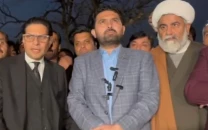

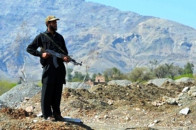

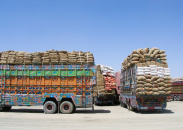
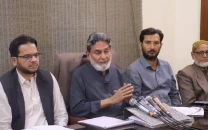












COMMENTS
Comments are moderated and generally will be posted if they are on-topic and not abusive.
For more information, please see our Comments FAQ